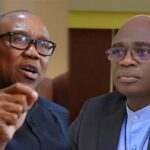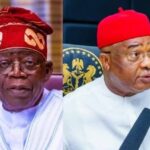Pandora Papers has exposed how Peter Obi broke the law with foreign shady deals and many secret businesses.

Former governor of Anambra State, Peter Obi has been indicted in foreign shady deals which saw him set up several off shore companies and kept secret assets in tax havens.
According to Premium Times, an investigation revealed that Peter Obi has several secret business dealings and relationships including some he clandestinely set up and operated overseas, including in notorious tax and secrecy havens in ways that breached Nigerian laws.
The investigation is part of the Pandora Papers project led by the International Consortium of Investigative Journalists (ICIJ), which Premium Times is a part of.
The project saw 600 journalists from 150 news organisations around the world poring through a trove of 11.9 million confidential files, contextualising information, tracking down sources and analysing public records and other documents.
The Pandora Papers, the biggest cross-border collaboration of journalists in history, is an investigation into a vast amount of previously hidden offshore companies, exposing secret assets, covert deals and hidden fortunes of the super-rich – among them more than 130 billionaires – and the powerful, including more 30 world leaders and hundreds of former and serving public officials across the world.
The confidential documents also feature a global cast of fugitives, convicts, celebrities, football stars and others, including judges, tax officials, spy chiefs and mayors.
The leaked records came from 14 offshore services firms from around the world that set up shell companies and other offshore nooks for clients like Mr Obi, who seek to shroud their financial activities, often suspicious, in secrecy.
Peter Obi, his daughter and a secret business
Mr Obi has two children- a daughter, Gabriella Nwamaka Frances Obi, and a son, Gregory Peter Oseloka Obi. Sometime in 2010, more than four years after he became governor, the politician developed an appetite to set up his first discreet company in the British Virgin Island. He named the company Gabriella Investments Limited, after his daughter
To set up what has now become a convoluted business structure, Mr Obi first approached Acces International, a secrecy enabler in Monaco, France, to help him incorporate an offshore entity in one of the world’s most notorious tax havens noted for providing conduits for wealthy and privileged corrupt political elites to hide stolen cash to avoid the attention of tax authorities.
Tax havens are politically and economically stable offshore jurisdictions or countries with extensive laws and systems that provide little or no tax obligations, but enable high secrecy and privacy protection for foreign individuals and businesses.
Mr Obi also paid Acces International to provide nominee directors for the company. Nominee directors are residents of tax havens paid to sit on boards of companies to hide the identities of real owners of offshore firms.
So, after accepting a brief from the then governor or his representatives, Acces International officials headed to the British Virgin Island, a notorious tax haven, where it contracted a local registered agent – Aleman Cordero Galindo & Lee Trust (BVI) Limited (Alcogal) — to set up Gabriella Investments Limited for Mr Obi.
The 36-year old Alcogal is a Panamanian law firm that went on to open overseas subsidiaries offering company formation and registered agent services in BVI, Seychelles, Belize, and Bahamas, and the preparation of corporate documentation in relation to the companies formed. It also provides trust services through its subsidiary trust companies in Panama, BVI, and Belize.
After extensive documentation, Gabriella Investment Limited was born on November 17, 2010, with registration number 1615538. Two figureheads – Antony Janse Van Vuuren and Lance Lawson — were appointed its first directors while ultimate control resided with Mr Obi.
On the same day the company was incorporated, the nominee directors met and issued 50,000 shares of Gabriella Investment in favour of Hill International Holding Corporation, a shell International Business Company operating under the laws of Belize, another tax haven. The director of the company is Mr Van Vuuren, also one of the directors of Gabriella Investment.
It is unclear what businesses Mr Obi transacted with the entities but in some communications, they were sometimes referred to as investment vehicles. Mr Obi told PREMIUM TIMES the offshore entity is the holding company for most of his assets and that the business structure he adapted was to enable him to avoid excessive taxation.
“I am sure you too will not like to pay inheritance tax if you can avoid it,” he told the reporters who interviewed him.
The Memorandum of Incorporation of Gabriella Investment said it was set up to carry on or undertake any business or activity, including trading of any commodities or goods, to do any act or enter into any transactions.
Recalibrating the structure and bringing family under the umbrella
Mr Obi has since rearranged his offshore businesses. First, he renamed Gabriella Investment. Beginning February 10, 2017, the company became known as PMGG Investments Limited in what is a combination of the first letters of the first names of Mr Obi’s nuclear family. P for Peter (ex-governor), M for Margaret (the ex-governor’s wife), G for Gabriella (the ex-governor’s daughter) and G for Gregory (the ex-governor’s son).
Mr Obi has also now created a trust known as The Gabriella Settlement, an entity also registered in the BVI. According to Fidelity Investments, a trust is a fiduciary arrangement that allows a third party, or trustee, to hold assets on behalf of a beneficiary or beneficiaries. Experts believe that trusts are traditionally used for minimising taxes even though they can offer other estate plan benefits as well.
By the current structuring of Mr Obi’s wealth and offshore businesses, The Gabriella Settlement, which appears to hold all or a majority of his assets, is the sole shareholder of PMGG Investments.
In turn, a New Zealander entity, Granite Trust Company Limited is the sole trustee of The Gabriella Settlement. Sam Access International, the Monaco-based secrecy enabler Mr Obi first hired in 2010 to set up his offshore structure, was until August 23, 2019, the sole shareholder of Granite Trust.
Antony Janse Van Vuuren, who has acted as a consistent and perpetual director for almost all of Mr Obi-related offshore entities popped up again, making the filing that brought in another Monaco-based company, Rhone Acces Sam as the sole shareholder of Granite Trust. However, Rhone Trust and Fiduciary S.A., a Swiss entity, is the ultimate holding company for Granite Trust.
Mr Peter Obi and his Man Friday
A central and recurring figure in former Governor Obi’s network of offshore companies and on whom the politician appears to place immense trust is Antony Janse Van Vuuren, a 70-year old South African based in the principality of Monaco in France. Experts in Illicit Financial Flows consider Monaco a tax haven because of its generous tax laws and policies.
According to KPMG Multi Family Office, the principality of roughly 30,000 inhabitants does not charge wealth tax, property tax, investment income tax, and capital gains tax. It also does not tax dividends and directors’ fees and unless they are French nationals, resident individuals are not subject to personal income tax while inheritance tax is zero per cent for spouses and direct beneficiaries. It is unclear if it was this mouth-watering tax regime that attracted Mr Obi to Monaco.
What is however clear is that, in 2010, four years after he became governor, the politician or his representatives hired Monaco-based Acces International, where Mr Van Vuuren has been partner and director for 25 years, to help him create a secret and intricate scheme for managing his assets. Mr Obi told PREMIUM TIMES that British Lloyds Bank’s advice informed his offshore structure decision.
From Monaco in France to Tortola in the BVI, to Wellington in New Zealand, and to Geneva in Switzerland, Mr Van Vuuren has travelled around the world running business errands for Mr Obi and taking major decisions on his behalf.
While Mr Obi stays comfortably behind the curtain, the South African has remained the face of the ex-governor’s companies and the assets they hold. For the past decade, he is the politician’s number one business arranger in the offshore world as well as the custodian of the politician’s business-related documents and correspondences.
Mr Van Vuuren, a veteran nominee director for possibly tens or hundreds of shell companies, attended the University of KwaZulu-Natal, where he graduated in 1967 with a Bachelor of Commerce, Accounting and Business Management. He also obtained an MBA from Durham University in 1977.
A History of Playing Offshore
A 1991 leaked incorporation document reveals a certain Peter Obi and two other individuals – Donatus Ogbogu and Uche Okagbue – to have incorporated Beauchamp Investments Limited in Barbados.
The firm was incorporated as an international business company on August 20, 1991, with registration number 7305. The setting up of the company was handled at the time by a certain Peter L. Chase. What businesses the company does and what assets it holds remain unclear. Mr Obi denied knowledge of the firm as well as of Messrs Ogbogu and Okagbue. He said the individual who incorporated Beauchamp was possibly another businessman who happened to bear a similar name as him.
However, Next International (UK) Limited, another of the former governor’s overseas companies, was incorporated on May 16, 1996, in London. Mr Obi and his wife, Margaret, were listed as directors while Next International (Nigeria) Limited (with 999 ordinary shares) and Mr Obi (with one ordinary share) were listed as shareholders.
The exact businesses the company undertook in its 25-year history remained unclear, although, on March 8, 2001, the firm reported taking a mortgage from Lloyds TSB Bank Plc for a property on 53 Clyde Road, Croydon.
Breaking the Law: Number 1
In Nigeria, a person is statutorily obligated to withdraw from engaging in or directing a private business, except if it is farming, upon becoming a public officer, Section Six (6) of the Code of Conduct Bureau and Tribunal Act stipulates.
However, our investigation, based on records obtained from the UK Companies House shows that Mr Obi continued to be a director of Next International (UK) Limited for 14 months after becoming the governor of Anambra State, thereby breaking Nigeria’s law. The politician resigned from the company on May 16, 2008, 14 months after he assumed duties as Anambra governor. He took office on March 17, 2006.
Mr Obi did not dispute the records PREMIUM TIMES cited but he claimed he “resigned immediately” by handing his wife his resignation letter. He suggested that his company might have failed to effect the changes on time or the UK Companies House did not immediately document his exit. But the UK companies registry said Mr Obi indeed resigned on May 16, 2008, and that it received his notice of resignation for electronic filing on June 16, 2008.
Breaking the law: Number 2
Nigerian public officers are required to declare “immediately after taking office and thereafter all” their properties, assets, and liabilities and those of his (or her) unmarried children under the age of eighteen years,” Nigeria’s 1999 Constitution stipulates (Section 11, Part of the Fifth Schedule).
PREMIUM TIMES investigation also found that Mr Obi breached this constitutional provision on assets declaration. We can authoritatively report that Mr Obi did not declare to the Code of Conduct Bureau the companies he tucked away in offshore secrecy havens.
Mr Obi caused to be created for him a structure of secrecy that had previously, until the Pandora Papers investigation, meant he could continue to hold foreign assets in a way that breaches Nigeria’s law without the knowledge of authorities in the country. In an extra layer of secrecy, Mr Obi used paid nominees as directors, while he remains the ultimate beneficial owner, making it nearly impossible to discover his interests in those companies but we obtained rare incorporation documents proving his link.
Otherwise, Mr Obi could have forever hoped to continue to hold the assets, that he did not declare when he had a statutory obligation to do so as a governor, without any authority or the public calling him to account.
In his response, Mr Obi ridiculously suggested that those offshore companies and assets are jointly owned with his family members and that he was not under obligation to declare companies jointly owned. “I don’t declare what is owned with others,” Mr Obi told PREMIUM TIMES. “If my family owns something I won’t declare it. I didn’t declare anything I jointly owed with anyone.”
This is contrary to the position of the Constitution, which specifies the declaration of all assets, whether jointly or partly owned, PREMIUM TIMES’ reporters told Mr Obi. He said he was not aware of that provision of the law.
Nevertheless, leaked records show Mr Obi is the sole ultimate beneficial owner of the offshore companies. So he did not even jointly own it with anyone.
In that case, Mr Obi has violated Nigeria’s Code of Conduct law and, if authorities decide to act appropriately, he could be arraigned before the Code of Conduct Tribunal, a special court that tries public officers for any contravention of the Code of Conduct for Nigerian public officers as spelt out in the Fifth Schedule of the Nigerian constitution.
The Code of Conduct Bureau (CCB) and the Code of Conduct Tribunal (CCT) were established to enforce “a high standard of morality in the conduct of government business, and to ensure that the actions and behaviour of public officers conform to the highest standards of public morality and accountability.”
Breaking the law: Number 3
The former governor could be charged with failing to declare his offshore holdings and their associated assets and operating foreign accounts while being a public officer.
The Nigerian constitution and the Code of Conduct Bureau and Tribunal Act forbid a public officer from maintaining or operating a bank account outside Nigeria. However, as a governor, Mr. Obi continued to operate and maintain foreign accounts, including with Lloyds TSB.
Mr. Obi told PREMIUM TIMES that he received the advice to create an offshore structure from Lloyds TSB, which then introduced him to intermediaries who helped him to set up com where he continued to operate a foreign account as a governor.
The offences violate sections of the Fifth Schedule of the Constitution of the Federal Republic of Nigeria 1999, as amended.
Asked if he is concerned that Nigerians would be disappointed at him following our finding of his opaque and lawless dealings as a governor, Mr Obi said he was more concerned about his U.K. and U.S. schools alumni network, his business and foreign creditors. He insisted that he served well as Anambra governor and Nigerians already have their opinions about him.
The former governor could be charged for failing to declare the company and its associated assets and perhaps operating foreign accounts while being a public officer.
Mr Obi told PREMIUM TIMES that he received the advice to create an offshore structure from Lloyds where he continued to operate a foreign account as a governor.
The offences violate sections of the Fifth Schedule of the Constitution of the Federal Republic of Nigeria 1999, as amended.
Mr Obi and missed tax opportunity
In June 2017, the federal government launched the Voluntary Assets and Income Disclosure Scheme (VAIDS), an initiative seeking voluntary disclosure of previously undeclared assets and income with a view to paying all outstanding liabilities. The VAIDS offered a nine-month window and incentives that included immunity from prosecution for tax evasion and undeclared assets, which would have benefited people like Mr Obi.
A key objective of the VAIDS was curbing illicit financial flows and tax evasion, which commonly feature the use of offshore holdings to shift taxes from where they are earned to havens where little or no taxes are paid.
The government in 2017 said defaulting individuals and corporate bodies who failed to take advantage of the VAIDS would be subject to criminal prosecution.
A number of Nigerian public officials with previously undeclared assets tucked away overseas participated in the VAIDS and got clearance certificates. Mr. Obi shunned the scheme and continued with his opaque business dealings in breach of the law.
KanyiDaily recalls that Peter Obi had also opened up about demanding the sum of N7 billion for installing his successor, Willie Obiano, as Anambra state governor.





![Residents In Tears As Plateau Community Buries 51 Killed In Fresh Attack [Video] 7 Residents In Tears As Plateau Community Buries 51 Killed In Fresh Attack [Video]](https://media.kanyidaily.com/2025/04/15103230/Plateau-attack-150x150.jpg)
![Portable’s New Signee, Wiznurudeen Breaks Down In Tears As He Begs Saheed Osupa [Video] 9 Portable’s New Signee, Wiznurudeen Breaks Down In Tears As He Begs Saheed Osupa [Video]](https://media.kanyidaily.com/2025/04/15095659/Portable-1-150x150.jpg)






![I'm Open To Becoming A Second, Third, Or Even Fifth Wife If Given The Chance - Toke Makinwa [Video] 23 I'm Open To Becoming A Second, Third, Or Even Fifth Wife If Given The Chance - Toke Makinwa [Video]](https://media.kanyidaily.com/2025/04/12184425/Toke-Makinwa-150x150.jpg)

